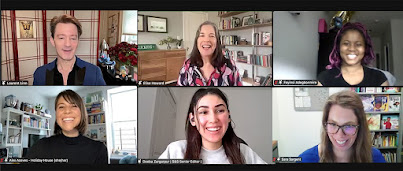Zareen Jaffery joined Simon & Schuster Books for Young Readers in February 2011, focusing on commercial and literary young adult and middle grade fiction, as well as teen nonfiction. Zareen works with a number of New York Times best-selling and critically acclaimed authors including Jenny Han, Lilliam Rivera, Claire Legrand, Octavia Spencer, and Andrew Solomon. In 2016, she began acquiring for Salaam Reads, an imprint that focuses on publishing books about Muslim children and families. Zareen served as a member of the CBC Diversity Committee, and is currently a co-chair of the Diversity within ALSC Task Force. Prior to Simon & Schuster, Zareen worked at HarperCollins Children’s Books and Hyperion books. Zareen is a graduate of New York University.
If there was a biography written about Zareen Jaffery, she says the title would be
One More Chapter: A Life of Stories.
And that title is apt. A sharp, smart and sophisticated editor with an already storied career, Zareen recently founded the Salaam Reads imprint at Simon & Schuster, meant to elevate Muslim voices -- something that's more necessary than ever.
"When I think about relevance, I think about that catch phrase: 'think global, act local.'"
She mentioned a recent acquisition:
The Weight of Our Sky by Hanna Alkaf (scheduled for Winter 2019). Set during the 1969 race riots in Kuala Lumpur, the YA novel features a Muslim protagonist who uses Beatles' songs as inspiration to survive a city engulfed in flames.
"I love that intersection of cultures because that happens all the time in real life," Zareen said. "The intersections and commonalities that exist are what connect us. We should be able to share and celebrate the differences."
When asked about the question of narrative bias as a reason a work might be rejected, Zareen said she's seen that happen firsthand in publishing.
"For me, we're shaped by the society we're in and the culture we grew up. You recognize what you know," she said, citing the concept of a 'single story' as the comfortable way we want to see certain cultures. "It happens unconsciously -- I see it myself in a lot of stories we see about Muslims. I call it the enlightenment narrative: the child who leaves behind their parents' old ways. But it puts forth a perception that there's a way to be 'a good immigrant.' That kind of story is more palatable to an audience that wants to believe in American exceptionalism."
It's one usually familiar way of looking at things, but not necessarily the only way, and the works Zareen gravitates to tend to twist those familiar narratives in interesting ways.
For example, one of the first narrative non-fiction books Zareen published was
The Pregnancy Project -- a memoir by a 17-year-old girl who pretended to be pregnant for a year. Gabby Rodriguez came from a family where teen pregnancy was the norm. A stellar student, she planned to buck that cycle, but faced challenges that came with her family history.
"There was an expectation that she would end up a teenaged parent," Zareen said. "And she did have an older boyfriend, which flamed the fuel of those stereotypes, so she decided to fake it and see what happened. It was really eye-opening. Some of the people that supported her plans to pursue college abandoned her -- as if becoming pregnant was a death sentence. The book had to do with family history and expectations and it was a page-turning emotional journey."
Asked about the concept of sensitivity readers for authors working on stories from communities or experiences that are not their own, Zareen had a lot to say. "I call them 'accuracy readers,'" Zareen said. "To quote Taylor Swift: they're a Band-Aid on a bullet hole. They sort of work around the whole #ownvoices conversation. People who come from marginalized communities often don't have the same access when it comes to publishing."
If you're writing from outside of your own experience, doing your due diligence is critical. She cites Laurie Halse Anderson as a hero when it comes to "writing outside your lane." (Bow down!)
And a single sensitivity reader is not going to be enough in most cases, Zareen said. "There is so much diversity within diversity. People are party to their own exploitation all the time. My memoir title was
One More Chapter. I have changed so much even recent years," she said. "I grew up in Connecticut and went to Catholic School and won an essay contest on why it''s important to go to Catholic school. Of course they didn't know I was Muslim." In other words, she said, you don't know what you don't know, even when it comes to what might be your own marginalization.
"There's a spectrum of experience," she explained. "Sometimes we need to look beyond ourselves and see things from a perspective we might not understand. That requires some stretching. You need to look for a diversity of voices within the group you're representing. Research is hugely important."
No matter what, Zareen said, keep on writing and telling stories. You have something to say. "Storytellers have been part of the human experience from the very beginning -- and truly believe that even the ones drawing the pictures on the wall of the caves had imposter syndrome," she said (to laughs from the crowd). "Editors deal with that, too. We are all here because we love books, we loves stories. And we want to hear yours."

































